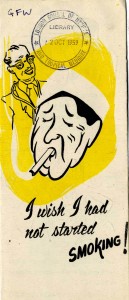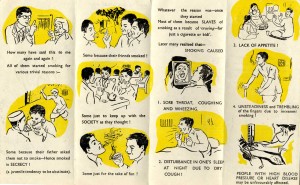The Archives hold a small file of papers on Professor Michael Stewart Rees Hutt (1922-2000), he appointed Professor of Pathology at Makerere University College, Kampala, in Uganda, 1962. Whilst in Uganda, Hutt organised a country-wide postal pathology system so that remote hospitals received diagnoses in time to be meaningful; enabled one of the few excellent tropical country cancer registries to be set up and stimulated much medical research. Hutt and Dennis Burkitt made a road safari around the mission and government hospitals of Uganda and eastern Zaire, mid-1960s, gathering cancer incidence data. This work on illnesses including Burkitt’s lymphoma, oesophageal and liver cancer was important in demonstrating that cancer is a very non-uniform disease. Hutt’s work regarding a tumour called Kaposi’s sarcoma (KS) showed that on the Uganda/Zaire border it accounted for 10 per cent of all tumours among adults, this occurred prior to the epidemic of HIV and Aids and was a crucial discovery. The collection contains diaries and papers relating to his time in Uganda.
Academics at the School, were the first to make the link between smoking and lung cancer. In 1950, Richard Doll, a member of the MRC Statistical Research Unit based at LSHTM and Austin Bradford Hill, Director of the Department of Medical Statistics and Epidemiology, published their study of lung cancer patients in 20 London hospitals which concluded that the risk of developing lung cancer increases with the amount of tobacco smoked. Following this initial study, they began a study of smoking amongst 40,000 British Doctors which produced a large body of data relating to the death rate from different diseases for non-smokers, light, moderate and heavy smokers. The results of the study, published in 1954, showed a steadily rising death rate from lung cancer and coronary thrombosis with increasing amounts smoked. The archives holds the memoirs of Sir Austin Bradford Hill who was Dean of the School between 1955 and 1957.
The Ross collections contains over 20,000 items of correspondence, photographs, reports and press cuttings relating to Ross’s discovery of the mosquito transmission of malaria and many other topics. His collection contains press cuttings on many different medical topics including roughly 60 cuttings that have cancer in the title, these are from the 1920s and relate to reports on new treatments and research.
Dr Charles Wilcocks was a former student of the School and was the Director of the Bureau of Hygiene & Tropical Disease which was based at the School for a time. The Archives holds his collection which includes radio scripts for the various shows that he contributed to including Doctor in the House for the BBC in the 1960s, these cover all types of medical conditions including cancers, some interesting sounding titles are: An African form of cancer, 1964; An investigation into the treatment of lung cancer, 1966; and Primary cancer of the liver in Uganda, 1968.
For further information, please contact the Archives service: archives@lshtm.ac.uk








